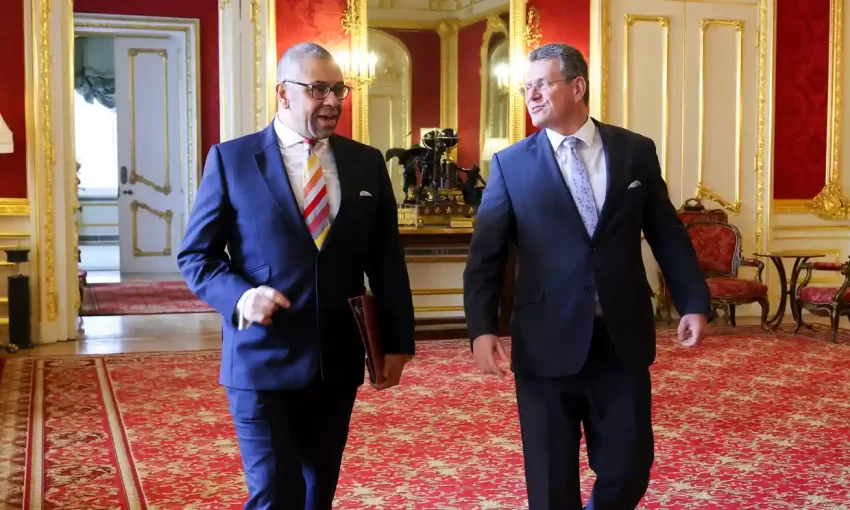The UK foreign secretary, James Cleverly, and the European Commission’s vice-president, Maroš Šefčovič, have committed to further talks to resolve the dispute over Brexit trading arrangements in Northern Ireland.
Following a “stock-taking” meeting on Monday afternoon, they agreed to continue what they described as “scoping work” to find potential solutions in a “constructive and collaborative spirit”.
UK government sources said there were still “significant gaps” in approaches to the Northern Ireland protocol and the sides were some distance from an agreement.
“The two sides discussed the range of existing challenges over the last two years and the need to find solutions together to tackle comprehensively the real-life concerns of all communities in Northern Ireland and protect both Northern Ireland’s place in the UK’s internal market and the integrity of the EU’s single market,” they said in a joint statement.
“They agreed that this scoping work for potential solutions should continue in a constructive and collaborative spirit, taking careful account of each other’s legitimate interests,” it said.
Senior EU officials have growing confidence and trust in the British government, but are also sensitive to remaining obstacles between the two sides in the protocol dispute, most notably checks at the Great Britain-Northern Ireland border and the role of the European court of justice.
Talks have entered a more intense, secretive phase with EU and UK officials said to be in “constant contact” and meeting at least every working day. The European Commission is sharing less information with EU member states, which diplomats have so far accepted as the price of allowing space for negotiators to find agreement.
“There is a lot of positivity towards the negotiations. The issues are complex, but the will is there,” said one EU diplomat. “The statement is more a reflection of ‘we will continue doing what we have been doing’.”
“I don’t think today is that announcement of going into the tunnel,” the person said, referring to a metaphor favoured by the British side to signal round-the-clock talks in the final stages of a negotiation. “But things are progressing well and negotiations will continue.”
Gaps include fundamental differences on governance and the role of the European court of justice, currently the sole arbiter of the Northern Ireland protocol in the event of a trade dispute.
A government source said one solution being put forward by the UK on the issue of the ECJ is to create an independent arbitration mechanism for trade disputes as a first port of call, but that the role of the ECJ would be retained as ultimate arbiter of disputes.
That stops short of the European Research Group demands for the ECJ to be removed entirely, but would create an intermediary step that could to some extent mollify the Brexit hardliners in the Tory party.
A similar proposal was mooted in an internal paper last year by the Northern Ireland minister, Steve Baker, who believes the issue can be resolved by moving the dispute mechanism into the parallel trade and cooperation agreement, something that does have the support of the ERG.
Talks, under way since September, are aimed at resolving three key issues: checks on goods entering Northern Ireland from Great Britain, the role of the ECJ and the application of EU law in Northern Ireland.
Informed sources said there was still “a long way to go” even on trade issues, despite a deal last Monday to give the EU access to real-time information via an HMRC database on goods travelling from Great Britain to Northern Ireland.
“We might have a database, but with grace periods we don’t have the data we need,” the source said in reference to the UK’s decision not to apply protocol rules mandating customs and other paperwork on food entering Northern Ireland from Great Britain.


